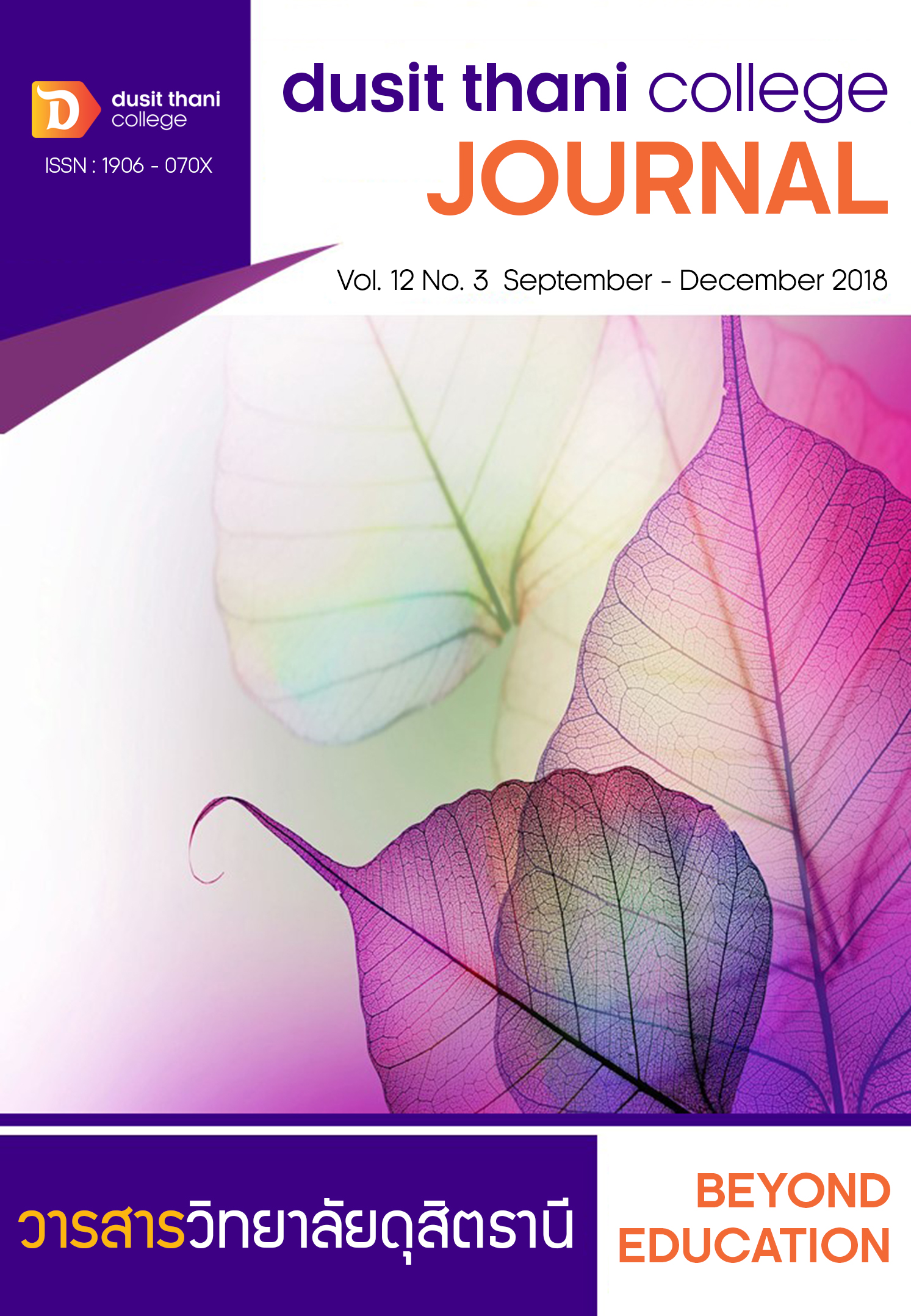Perceptions and Expectations of Stakeholders to the Internship Program for Bachelor of Arts in Hotel Business Program Suan Dusit University
Main Article Content
Abstract
The purposes of this study were: 1) to examine the stakeholders’ perceptions and expectations to the Internship program for Bachelor of Arts in hotel business program 2) to compare stakeholders’ perceptions and expectations to the Internship program for bachelor of arts in hotel business program 3) to propose a development approach to the Internship project. This was a mixed methods research. The sample were consisted of 104 second year, student code 57, students at the Bachelor of Arts in Hotel Business Program and 104 parents. The qualitative data were collected through interviews with 20 hotel collaborative consultant, 10 hotel collaborative staff and 34 hotel entrepreneurs. The instrument used in the study was a questionnaire and interviews. Data were analyzed using statistics in frequency, percentage, mean, standard deviation, t-test and hypotheses tested by paired-samples test. Data from the interviews were classified into categories and concluded using descriptive analysis.
The result found that: 1) Overall of students’ perceptions and expectations to the Internship program showed that perceptions were highest, as numerical analysis communication and information skill, morality and ethics skill, personality skill, knowledge skill, cognitive skill and interpersonal skill. Expectations were highest, as personality skill, morality and ethics skill, cognitive skill, numerical analysis communication and information skill, knowledge skill and interpersonal skill. And Overall of parents’ perceptions and expectations to the Internship program showed that perceptions were highest, as morality and ethics skill, numerical analysis communication and information skill, personality skill, knowledge skill, cognitive skill and interpersonal skill. Expectations were highest, as morality and ethics skill, cognitive skill, interpersonal skill, knowledge skill, numerical analysis communication and information skill and personality skill. 2) Comparative test results of students’ perceptions and expectations, classified by sex showed that different sex were showed different perceptions and expectations. Differences were statistically significant at 0.5. Apart from these there were no differences. 3) Development guidelines for internship project were as follows: Morality and ethics skill were conform to hotel rules, diligence, patience, and work well with others. Knowledge skill were consume a modern knowledgeable, improvement their ability to develop their work, improve professional skills and attitude of service. Cognitive skill were decent communication skills in Thai, English and other languages correctly, creative and the ability to solve problems effectively. Interpersonal skill were work well with others, responsible for the work completed effectively, tolerate the pressure of work due to customer service colleagues and agencies. Numerical analysis communication and information skill were use technology to communicate and work, ability to use office equipment effectively. Personality skill were a good attitude towards the service, decent physical and mental health, confidence in yourself, challenge to express, willing to serve, compassion for others and control their own emotions.
Article Details
Article Screening Policy
- All research and academic articles to be published must be considered and screened by three peer reviews in the relevant field / article.
- All articles, texts, illustrations and tables published in the journal are the personal opinions of the authors. Editors don't always have to agree. And no responsibility whatsoever is the sole responsibility of the author.
- The articles to be published must never be published. Where did you first publish? And not in the consideration of other journals If the audit found that there has been a duplicate publication It is the sole responsibility of the author.
- Any article that the reader sees as being plagiarized or impersonated without reference. Or mislead the work of the author Please let the journal editor know it will be your greatest blessing.
References
Loei Rajabhat University.
2. Chakrapong Chomchoei. (2007). Opinions and Expectations of Employees Regarding the Company. Thesis in Industrial Technology. Phetchaburi Rajabhat University.
3. Chanchieng, Saranya. (2007). A study of the State of Perception and the State of Affairs in Promoting Local Wisdom of Educational Institutions. Department of General Education Uttaradit. Nopparat. Uttaradit Rajabhat University.
4. Choomyen, Oratai & Padungkarn, Raiwadee. (2014). Expectations and Satisfaction of Supervisors on the Characteristics of Internship Students Rajamangala University
of Technology.Faculty of Liberal Arts Rajamangala University of Technology.
5. Mingpreecha, Supattra. (2007). Expectations and Satisfaction of Outpatient Service Users toward the Quality of Service of Phrae Hospital. Master Thesis Uttaradit Rajabhat University.
6. Phusrerith, Sa-ngah. (2007). A Study of Expectations and Satisfaction of Enterprises in the Province. Mahasarakham College of Technology. Thesis Master of Education. Mahasarakham Rajabhat University.
7. Pinitluke, Suneth. (2007). Perception of Basic School Management as a Legal Entity of School Administrators. Chaiyaphum Educational Service Area Office 1-3. thesis. Loei Rajabhat University.
8. Pinyapong,Jakkrit. (2007). Perception of Male Role and Reproductive Health of Male and Female Students in Uttaradit Province. Thesis.Institute for Population and Social Research. Mahidol University.
9. Suan Dusit University. (2011). School Guide to Tourism and Hospitality. Bangkok: School of Tourism and Hospitality Saun Dusit University.
10. Suwan, Narongchai. (2008). Satisfaction and Expectation of Members towards Service of Savings Cooperative: A case study of 32 border patrol police savings limited. Master of Business Administration Chiangrai Rajabhat University
11. Yoongarn, Yanisa. (2011). The Relationship between Teachers' total Efficacy and the Learning Achievement of Learners in Schools under the Office of Loei Educational Service Area 1. thesis. Resource Center. Loei Rajabhat University.


